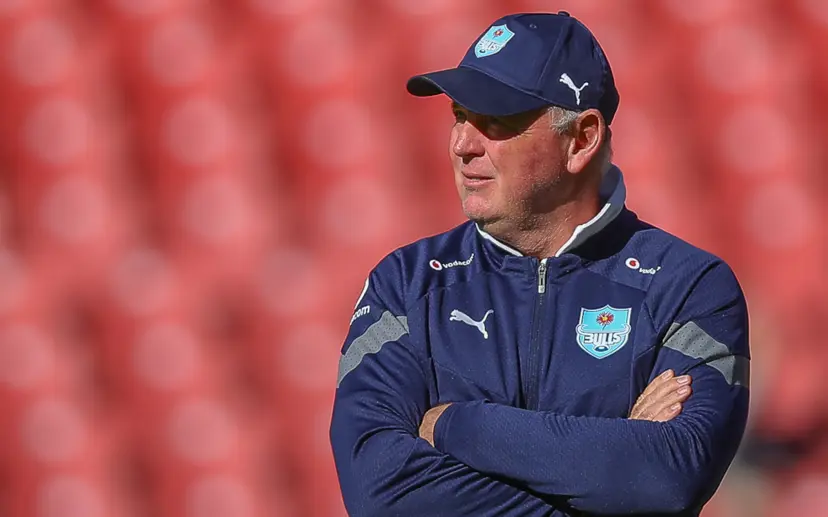Why Jake White left the Bulls: What really happened?

Jake White departs Bulls after players and coaching staff demand leadership change—tensions peaked following the URC final defeat to Leinster. Photo credit: Gallo Images
In what has sent shockwaves through South African rugby, Jake White has stepped down from his role as Bulls’ Director of Rugby with immediate effect. While his departure may have caught the public off guard, insiders say the writing had been on the wall for weeks.
Despite guiding the Bulls to the 2024/25 United Rugby Championship (URC) final, internal tensions with players and support staff reached breaking point. Multiple sources have since confirmed that a player-led revolt—backed by assistant coaches—forced the board’s hand in removing White, citing the need for a “new voice” in the locker room.
Player Rebellion Led by Bulls Veterans
The core of the drama centres on a growing disconnect between White and senior Bulls players, including Ruan Nortjé and Marcell Coetzee, both of whom are said to have voiced frustration with White’s leadership style.
Backroom staff like Andries Bekker (forwards coach) and Chris Rossouw (attack coach) were also part of the opposition bloc, reportedly refusing to extend contracts or continue under his management. A clear message was delivered: if Jake White stayed, they would go.
The coaching structure had become “toxic,” according to sources close to the team. These tensions had been simmering for months but erupted fully in the aftermath of the URC final loss to Leinster.
Communication Breakdown: Public Criticism Backfires
Another factor that aggravated the situation was White’s public commentary, especially his remarks following the Bulls’ 32–7 loss in the URC final. Instead of shielding the players, he compared the Bulls’ bench to that of Leinster, calling into question the squad’s depth and ability to compete at elite levels.
He also publicly criticised young talent like Canan Moodie, which many saw as demoralising and divisive. These actions further distanced him from the dressing room, according to insiders.
Players allegedly felt undermined and unsupported—a stark contrast to the modern coaching ethos that values transparency and mutual respect.
URC Final Defeat: The Final Straw
While reaching the URC final was a significant achievement, the humbling loss at Croke Park highlighted long-standing strategic and morale issues within the team.
The margin of defeat, combined with White’s post-match comments, left players and fans alike questioning whether the Bulls had hit a ceiling under his leadership. This triggered emergency meetings with the board, leading to discussions about succession and change.
Board Intervention: Mutual Agreement or Forced Exit?
Though White’s departure is being publicly framed as a mutual agreement, reports suggest it was the culmination of a boardroom decision to preserve the club’s culture and future cohesion.
With relationships strained beyond repair and staff members unwilling to continue under his regime, the Bulls’ leadership decided to end his contract—originally valid until 2027. Sources say the board considered the club’s long-term performance and internal harmony before finalising the exit.
What Next for the Bulls? Ackermann and Alternatives Lined Up
With White’s exit now official, the Bulls are reportedly eyeing Johan Ackermann, the former Lions and Gloucester coach, as a top candidate for the job. However, complications regarding his current commitment to the SA U20 team could delay his appointment.
Other candidates are being considered to stabilise the squad and restore dressing room unity, especially ahead of pre-season planning for the next URC cycle and domestic competitions.
A Tactical Giant Brought Down by Fractured Relationships
Jake White’s rugby resume speaks for itself: a World Cup winner, tactical mastermind, and decorated coach with success in multiple countries. But at the Bulls, internal relationships—not results—proved to be his undoing.
His departure is a powerful reminder that modern rugby leadership requires not just strategy and experience, but trust, communication, and emotional intelligence. For the Bulls, the next chapter begins now—and it starts with healing.

